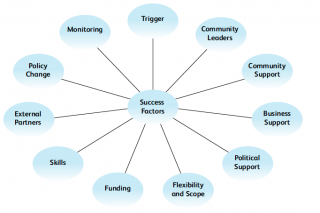Public Engagement – September 2012 Newsletter
Climate Change and Moral Judgement
Recently blogger David Roberts reviewed an academic article on the lack of moral outrage we have when it comes to climate change. We don’t experience outrage when we hear about reports on the melting of the polar ice caps. The article ‘Climate Change and Moral Judgement’ addresses this lack of emotional attachment to these issues by address some of the psychological factors that influence our emotion, or lack thereof. The article lists six psychological barriers keeping cliamte change from reigstering on our moral judgement.
These include:
1. The abstract nature of climate change makes it difficult for us to internalise.
2. We can’t easily place the blame on an individual or a group.
3. Since climate change is linked to human activities we automatically get defensive about our way of life out of guilt.
4. Uncertainty leads to optimism, the science is still evolving so we think it really isn’t as bas as they predict it will be.
5. Climate change is often presented with liberal values, leaving conservatives disinterested.
6. The long time horizons and our distance from those areas that are most vulnerable make it easy for us to ignore the issues.
So where do we go from here? The article does give us a a bit of hope. Here are six strategies to communicate the moral imperative of climate change.
1. Frame climate change by using broad values that are tend to be universal (for example Common Cause)
2. Focus messages on costs to future generations.
3. Motivate through messages of pride, hope, and gratitiude as opposed to guilt, shame, or fear.
4. Be careful not to push too hard on action against climate change as good business, it may backfire.
5. Expand group identity to include future generations and people in more distant places.
6. Highlight positive social norms.
Tackling Incivilities
The Carnegie UK Trust produced a report on the disparity between public policy and what local citizens really care about when it comes to environmental issues. It has been shown that the look of the local environment has a great impact on people’s well-being. Graffiti, litter and dog fouling have a huge impact on the neighbourhoods but these factors tend to be excluded from public policy that concentrates on social issues or climate change. These environmental incivilities are highly visible and tend to have the greatest imapct. Neighborhoods that are well cared for tend to have higher rates of neighborhood pride. The solution to this is to give communities and local authorities greater control over these issues. In areas where community groups have taken it upon themselves to ‘tidy up’ has led to higher feelings of safety, pride and over all well-being. Below is a list of eight success factors that were observed among case studies of community programmes across the UK.
Evolutionary Psychology and Sustainable Behaviour
While we are on the subject of behaviour change, I received an article on Evolutionary Psychology and Sustainable Behaviour (email me if you would like a copy). It discusses the five adaptive tendencies are at the root of our environmental and social problems. A lot of this supports the ideas presented in the first article discussing climate change and moral judgement. The five adaptive tendencies are 1) propensity for self-interest, 2) desire to achieve relative status within social groups, 3) tendency to sub-consciously copy others, 4) our tendency to focus on the short-term and 5) our disregard for things we cannot see or feel. The authors’ suggestions for overcoming these problems include using the power of social networking tools to mimic ancestral communities, thus building closer ties to our neighbours. Forming and reinforcing these types of relationships help overcome the adaptive tendencies we have. The closer ties we have to our community and neighbours the more likely we are to work to protect it for both the short-term and long-term.

The use of Evolutionary Psychology in behaviour change research is increasing, as it often explains the underlying drivers to our behaviour. For example, recycling rates tend to be high, not only because it is easy, but because it is a highly visible activity. We can easily display to our neighbours that we care for the environment by recycling. This is less easy to do with other measures such as loft insulation. Other activities that boast the message of cost savings tend to have less uptake because the idea that a person needs to save money has a negative connotation to it. Leaving the lights on is a visible display to neighbours that you have the resource wealth to do so. This seems counter-intuitive but our identities are often tied to these forms of resource use and people are reluctant to be associated with the negative identity that they are unable to afford certain comforts.
Scoring Supermarkets
The topic of food has come up quite a bit lately, and beginning in October the newest series in the Greener Together campaigns will focus on reducing food waste. For those living in Edinburgh you may have noticed the new food waste bins on neighbourhood streets and you may have even gotten the nifty little container to bring into your flat complete with biodegradable bags! It is quite amazing to see how little you put in the bin after recycling and composting everything you can. Environmental Blogger, Green Steve decided to go a step further and give the leading supermarkets in the UK a grade for how carbon friendly they are. This is not an easy task given the differences in reporting among the top six supermarkets - perhaps another issue to discuss in the future. This lack in consistency in measures and reporting often makes it difficult for carbon conscious consumers to make the right decisions.
Other News
The Public Engagement pages have been updated to include useful resources, blogs and the Workplace Behaviours Presentation. The presentation is available for download and can be edited for your business’ specific needs.
A 2020 countdown widget is available for adding to your website. You can get the widget here!
Sustainable Scotland Network Conference coming up 8th of November




